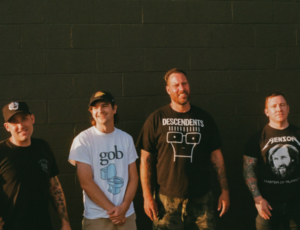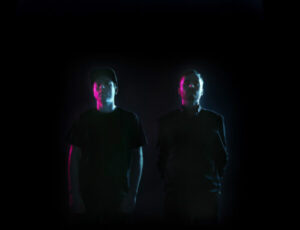
Album releases are some of the strangest parties I’ve ever been to.
If you show up even a little early, no one is there. It’s sort of nice, you can grab a beer without much trouble, take a seat and people-watch.
The band will mill around with friends and girlfriends while the openers try to unobtrusively tune up. The first opener starts—and at release parties, there’s often at least two opening bands—and still, no one’s there. Audience members mince gingerly towards the dance floor, heads shyly bobbing, being careful not to show too much appreciation for a band that might be declared unbearably lame in a matter of weeks.
By the time the second and third openers arrive onstage, the crowd has had another beverage or two and is more likely to be personally acquainted with the performers. The dance floor fills with the first giddy flush of strong drink. The people that will eventually end up puking their guts out on the SkyTrain are still fairly coherent; blushing pairs who didn’t know if they’d go home together start growing accustomed to the idea.
Then there’s the point of critical mass, a one- to two-hour window where the audience is too drunk to pretend to be cool and resigns themselves to dancing; a point where what happens onstage is merely ancillary to the elation of a Saturday night; where what matters is not what happens now but the fact it won’t matter in the morning.
After the climax, things change. Audience members who maybe should have stopped a drink or two ago don’t realize how far they’ve gone. The opening bands have only just begun to imbibe; but are already unsteady from the adrenaline of performance. The mood shifts: the crowd gets tired and a little mean. Pretty soon, everyone remembers that they have a train to catch, or a friend to call, or simply that they’d rather find a bar with available seats and no one to applaud but themselves.
The anatomy of a release party is a strange, unwieldy thing.
This Saturday’s beekeeper release party at the Media Club was no exception.
Relative unknowns
Fine Times took the stage before the club was half full, but their full sound soon managed to fill the space the audience had yet occupy. The brainchild of vocalist/guitarist Matthew Moldowan and vocalist/bassist Jeffrey Powell, Fine Times became a temporary five-piece with the additions of percussionist Juice, guitarist and back-up vocalist Jahmeel Russell and synthesizer guru Mark Crickmay.
Fun and poppy, Fine Times somehow manages to be a sort of bricolage of decades without sounding overdone or confused. Candy-sweet elements of early ‘60s pop falls in line with synthesizer riffs reminiscent of the 1980s; sometimes with a surprising but fun inclusion of Beegees-style falsetto from Moldowan. The set was short but energetic and shows a lot of promise.
Next up was a bizarre but enjoyable four-song interlude by
Brother Act. Declared (jokingly) by Devon Lougheed to be “Vancouver’s answer to Broken Social Scene,” the group is composed of musicians from some of Vancouver’s best-loved acts: rapper Shad, David Vertesi (Hey Ocean!), Johnny Andrews (former drummer for Tegan and Sara, currently in Rococode), Peter Carruthers (formerly of Said the Whale, currently of Siskiyou) and Lougheed himself (Hey Ocean!, beekeeper).
Proclaimed to be both the first show and the last (say it ain’t so!) Vertesi, the band gave a peppy, clever performance. Hopefully this isn’t the last we see of Brother Act: they’re the perfect marriage of a 1990s throwback with a good dash of millennial irony thrown in. Sharp lyrics and witty concepts set Brother Act apart. Take, for example, “Men in Love Are Like Old People With Computers” (sample lyric: “You die when you fall at my age”): clever double entendres pair with a genuine sweetness to create a hilarious-yet-touching love song.
Then came established Vancouver darlings
The Belle Game. The Belle Game doesn’t need the sort of powerhouse beginnings Fine Times and Brother Act put forward; they started off slow, calmly drawing the crowd onto the dance floor, quieting the crowd with nearly no effort. The crowd had reached its peak now (I would later learn that this was the band many, if not most, had come to see), both in size and energy.
The Belle Game, an impressive indie-pop seven piece, was in an especially celebratory mood:
“Happy Super Moon; happy beekeeper release and happy Cinco de Mayo!” guitarist and lead male vocalist Adam Nanji announced before launching into their second song, the languid “River.” Most of The Belle Game’s lead vocals are sung by Andrea Lo.
I’ve seen The Belle Game before and have always been impressed by Lo’s delicate, dreamy vocals, which seemed overpowered by echo effect on her microphone. Even so, the group put on a great performance that had the now-rowdy crowd hollering for more.
Remember the map I drew for you? Now is the peak of the mountain; the part where the audience is intoxicated and excitable. Even before the penultimate song, the audience was yelling for more. Apparently, the now-crowded room was suffering under the delusion that this was, in fact, The Belle Game’s show. It wasn’t.
The Belle Game, gracious as ever, conceded to play another song, but only after asking permission first (aw!) and then thanking beekeeper, profusely, and repping the single we were there to celebrate (
Take Me Back (to the Place)). I already knew I liked The Belle Game, but they impressed me that Saturday night. Sure, the music is great (strong female harmonies from Lo and keyboardist Katrina Jones; Beirut-style lines from trumpet player Andrew Lee; adorable boy-girl dutes from Lo and Nanji).
Their stage presence, however, is what endeared them to me at this show. Their courtesy, gratitude and palpable joy onstage was a pleasure to watch, despite the crowd’s disorderly nature and your journalist’s relative sobriety.
The main event was, of course,
beekeeper. The crowd, however, was reaching the edges of the map, the moment your GPS when you have to scroll to the next screen to figure out where the hell you are. It should be said, as well, that beekeeper isn’t exactly the easiest band to get into. They’re challenging: their rhythms are odd, the style changes constantly. The band started out the night with the brash and poppy “Table and Bed,” a fun effort that uses the voices and talents of all three band members (Lougheed, bassist Brandi Sidoryk and drummer Luke Cyca) to great, if complex effect.
I must admit: some people were turned off.
Maybe it’s the edge-of–the-map effect, maybe it was the music itself, maybe everyone was just drunk and tired and wanted to go home (it was near midnight when beekeeper took the stage). In any case, the crowd thinned quickly. The young men that had helped me find the
Media Club earlier that night (I get lost easily) left in protest after making some uncouth gestures involving beer and their genitalia.
Sample conversation:
Drunk Concertgoer: “It’s boring! Everything’s in 4/4 time!”
Band: [switches time signatures]
Brilliant Reporter: “Are you joking?”
D.C.: [tries to keep time, realizes the change, leaves in frustration]
(I promise, this happened.)
So, instead of boring you with another thousand words, I’ll give you a quick rundown of things I loved about the beekeeper show, and things I thought they could do better.
Loved:
No one puts Cyca in a corner. The drum kit is right up front, on the same latitude as Sidoryk and Lougheed. This is also great because what Cyca does is incredibly complex- it’s like he drumming in fractals.
Sidoryk and Lougheed sound great together—their musical back-and-forth and onstage platonic flirting is adorable. Admission: I am a sucker for boy-girl vocals.
There were many, many songs I liked: beekeeper’s take on country was a backwoods kind of awesome, “Spider Webs/Insect Eyes” (from 2010’s
BE KEPT) is stilted and dark in all the right ways, I love the anger in “Hurt an Enemy.” The live performance of the single “Take Me Back (to the Place)” was cheerful and fun.
Things that could have happened differently:
Banter! Lougheed lands a lot of his jokes, but the ones that fell flat fell really, really flat. Pancake flat. You can tell he’s trying to channel his attention deficit in an interesting stage show, and again: it works really well about half the time. When it doesn’t work, however, it comes off as unsteady.
The set list:
I would have arranged the songs differently. I spoke to Cyca about this after the show, and he felt the band front-loaded their more accessible pieces. I disagreed at the time, saying that feel-good pop (like the single) could have happened earlier (I’d actually stand by that now). Upon reflection and the re-reading of my notes, Cyca may have had a point (let’s face it, he knows his set list much better than I do). Going through
BE KEPT and reconsidering the show, I’d venture to say that I completely reverse my original statement:
Let your freak flag fly! Play the weird stuff first! Be provocative! Beekeeper is anything and everything, but never boring, and it bothered me a little that some people thought they were. How can a band that fits four different styles into a four-minute song be dull?
All in all, beekeeper is a fun, somewhat challenging band that needs to find its niche: play to the right crowd (not following a widely acclaimed act like The Belle Game might help), tighten up the stage show, keep doing what you do best: being your awesome, complex, daydreaming selves. Focus a little more, but not too much. And, most importantly, keep the buzz going.
 Album releases are some of the strangest parties I’ve ever been to.
If you show up even a little early, no one is there. It’s sort of nice, you can grab a beer without much trouble, take a seat and people-watch.
The band will mill around with friends and girlfriends while the openers try to unobtrusively tune up. The first opener starts—and at release parties, there’s often at least two opening bands—and still, no one’s there. Audience members mince gingerly towards the dance floor, heads shyly bobbing, being careful not to show too much appreciation for a band that might be declared unbearably lame in a matter of weeks.
By the time the second and third openers arrive onstage, the crowd has had another beverage or two and is more likely to be personally acquainted with the performers. The dance floor fills with the first giddy flush of strong drink. The people that will eventually end up puking their guts out on the SkyTrain are still fairly coherent; blushing pairs who didn’t know if they’d go home together start growing accustomed to the idea.
Then there’s the point of critical mass, a one- to two-hour window where the audience is too drunk to pretend to be cool and resigns themselves to dancing; a point where what happens onstage is merely ancillary to the elation of a Saturday night; where what matters is not what happens now but the fact it won’t matter in the morning.
After the climax, things change. Audience members who maybe should have stopped a drink or two ago don’t realize how far they’ve gone. The opening bands have only just begun to imbibe; but are already unsteady from the adrenaline of performance. The mood shifts: the crowd gets tired and a little mean. Pretty soon, everyone remembers that they have a train to catch, or a friend to call, or simply that they’d rather find a bar with available seats and no one to applaud but themselves.
The anatomy of a release party is a strange, unwieldy thing.
This Saturday’s beekeeper release party at the Media Club was no exception.
Relative unknowns Fine Times took the stage before the club was half full, but their full sound soon managed to fill the space the audience had yet occupy. The brainchild of vocalist/guitarist Matthew Moldowan and vocalist/bassist Jeffrey Powell, Fine Times became a temporary five-piece with the additions of percussionist Juice, guitarist and back-up vocalist Jahmeel Russell and synthesizer guru Mark Crickmay.
Fun and poppy, Fine Times somehow manages to be a sort of bricolage of decades without sounding overdone or confused. Candy-sweet elements of early ‘60s pop falls in line with synthesizer riffs reminiscent of the 1980s; sometimes with a surprising but fun inclusion of Beegees-style falsetto from Moldowan. The set was short but energetic and shows a lot of promise.
Next up was a bizarre but enjoyable four-song interlude by Brother Act. Declared (jokingly) by Devon Lougheed to be “Vancouver’s answer to Broken Social Scene,” the group is composed of musicians from some of Vancouver’s best-loved acts: rapper Shad, David Vertesi (Hey Ocean!), Johnny Andrews (former drummer for Tegan and Sara, currently in Rococode), Peter Carruthers (formerly of Said the Whale, currently of Siskiyou) and Lougheed himself (Hey Ocean!, beekeeper).
Proclaimed to be both the first show and the last (say it ain’t so!) Vertesi, the band gave a peppy, clever performance. Hopefully this isn’t the last we see of Brother Act: they’re the perfect marriage of a 1990s throwback with a good dash of millennial irony thrown in. Sharp lyrics and witty concepts set Brother Act apart. Take, for example, “Men in Love Are Like Old People With Computers” (sample lyric: “You die when you fall at my age”): clever double entendres pair with a genuine sweetness to create a hilarious-yet-touching love song.
Then came established Vancouver darlings The Belle Game. The Belle Game doesn’t need the sort of powerhouse beginnings Fine Times and Brother Act put forward; they started off slow, calmly drawing the crowd onto the dance floor, quieting the crowd with nearly no effort. The crowd had reached its peak now (I would later learn that this was the band many, if not most, had come to see), both in size and energy.
The Belle Game, an impressive indie-pop seven piece, was in an especially celebratory mood:
“Happy Super Moon; happy beekeeper release and happy Cinco de Mayo!” guitarist and lead male vocalist Adam Nanji announced before launching into their second song, the languid “River.” Most of The Belle Game’s lead vocals are sung by Andrea Lo.
I’ve seen The Belle Game before and have always been impressed by Lo’s delicate, dreamy vocals, which seemed overpowered by echo effect on her microphone. Even so, the group put on a great performance that had the now-rowdy crowd hollering for more.
Remember the map I drew for you? Now is the peak of the mountain; the part where the audience is intoxicated and excitable. Even before the penultimate song, the audience was yelling for more. Apparently, the now-crowded room was suffering under the delusion that this was, in fact, The Belle Game’s show. It wasn’t.
The Belle Game, gracious as ever, conceded to play another song, but only after asking permission first (aw!) and then thanking beekeeper, profusely, and repping the single we were there to celebrate (Take Me Back (to the Place)). I already knew I liked The Belle Game, but they impressed me that Saturday night. Sure, the music is great (strong female harmonies from Lo and keyboardist Katrina Jones; Beirut-style lines from trumpet player Andrew Lee; adorable boy-girl dutes from Lo and Nanji).
Their stage presence, however, is what endeared them to me at this show. Their courtesy, gratitude and palpable joy onstage was a pleasure to watch, despite the crowd’s disorderly nature and your journalist’s relative sobriety.
The main event was, of course, beekeeper. The crowd, however, was reaching the edges of the map, the moment your GPS when you have to scroll to the next screen to figure out where the hell you are. It should be said, as well, that beekeeper isn’t exactly the easiest band to get into. They’re challenging: their rhythms are odd, the style changes constantly. The band started out the night with the brash and poppy “Table and Bed,” a fun effort that uses the voices and talents of all three band members (Lougheed, bassist Brandi Sidoryk and drummer Luke Cyca) to great, if complex effect.
I must admit: some people were turned off.
Maybe it’s the edge-of–the-map effect, maybe it was the music itself, maybe everyone was just drunk and tired and wanted to go home (it was near midnight when beekeeper took the stage). In any case, the crowd thinned quickly. The young men that had helped me find the Media Club earlier that night (I get lost easily) left in protest after making some uncouth gestures involving beer and their genitalia.
Sample conversation:
Drunk Concertgoer: “It’s boring! Everything’s in 4/4 time!”
Band: [switches time signatures]
Brilliant Reporter: “Are you joking?”
D.C.: [tries to keep time, realizes the change, leaves in frustration]
(I promise, this happened.)
So, instead of boring you with another thousand words, I’ll give you a quick rundown of things I loved about the beekeeper show, and things I thought they could do better.
Loved:
No one puts Cyca in a corner. The drum kit is right up front, on the same latitude as Sidoryk and Lougheed. This is also great because what Cyca does is incredibly complex- it’s like he drumming in fractals.
Sidoryk and Lougheed sound great together—their musical back-and-forth and onstage platonic flirting is adorable. Admission: I am a sucker for boy-girl vocals.
There were many, many songs I liked: beekeeper’s take on country was a backwoods kind of awesome, “Spider Webs/Insect Eyes” (from 2010’s BE KEPT) is stilted and dark in all the right ways, I love the anger in “Hurt an Enemy.” The live performance of the single “Take Me Back (to the Place)” was cheerful and fun.
Things that could have happened differently:
Banter! Lougheed lands a lot of his jokes, but the ones that fell flat fell really, really flat. Pancake flat. You can tell he’s trying to channel his attention deficit in an interesting stage show, and again: it works really well about half the time. When it doesn’t work, however, it comes off as unsteady.
The set list:
I would have arranged the songs differently. I spoke to Cyca about this after the show, and he felt the band front-loaded their more accessible pieces. I disagreed at the time, saying that feel-good pop (like the single) could have happened earlier (I’d actually stand by that now). Upon reflection and the re-reading of my notes, Cyca may have had a point (let’s face it, he knows his set list much better than I do). Going through BE KEPT and reconsidering the show, I’d venture to say that I completely reverse my original statement:
Let your freak flag fly! Play the weird stuff first! Be provocative! Beekeeper is anything and everything, but never boring, and it bothered me a little that some people thought they were. How can a band that fits four different styles into a four-minute song be dull?
All in all, beekeeper is a fun, somewhat challenging band that needs to find its niche: play to the right crowd (not following a widely acclaimed act like The Belle Game might help), tighten up the stage show, keep doing what you do best: being your awesome, complex, daydreaming selves. Focus a little more, but not too much. And, most importantly, keep the buzz going.
Album releases are some of the strangest parties I’ve ever been to.
If you show up even a little early, no one is there. It’s sort of nice, you can grab a beer without much trouble, take a seat and people-watch.
The band will mill around with friends and girlfriends while the openers try to unobtrusively tune up. The first opener starts—and at release parties, there’s often at least two opening bands—and still, no one’s there. Audience members mince gingerly towards the dance floor, heads shyly bobbing, being careful not to show too much appreciation for a band that might be declared unbearably lame in a matter of weeks.
By the time the second and third openers arrive onstage, the crowd has had another beverage or two and is more likely to be personally acquainted with the performers. The dance floor fills with the first giddy flush of strong drink. The people that will eventually end up puking their guts out on the SkyTrain are still fairly coherent; blushing pairs who didn’t know if they’d go home together start growing accustomed to the idea.
Then there’s the point of critical mass, a one- to two-hour window where the audience is too drunk to pretend to be cool and resigns themselves to dancing; a point where what happens onstage is merely ancillary to the elation of a Saturday night; where what matters is not what happens now but the fact it won’t matter in the morning.
After the climax, things change. Audience members who maybe should have stopped a drink or two ago don’t realize how far they’ve gone. The opening bands have only just begun to imbibe; but are already unsteady from the adrenaline of performance. The mood shifts: the crowd gets tired and a little mean. Pretty soon, everyone remembers that they have a train to catch, or a friend to call, or simply that they’d rather find a bar with available seats and no one to applaud but themselves.
The anatomy of a release party is a strange, unwieldy thing.
This Saturday’s beekeeper release party at the Media Club was no exception.
Relative unknowns Fine Times took the stage before the club was half full, but their full sound soon managed to fill the space the audience had yet occupy. The brainchild of vocalist/guitarist Matthew Moldowan and vocalist/bassist Jeffrey Powell, Fine Times became a temporary five-piece with the additions of percussionist Juice, guitarist and back-up vocalist Jahmeel Russell and synthesizer guru Mark Crickmay.
Fun and poppy, Fine Times somehow manages to be a sort of bricolage of decades without sounding overdone or confused. Candy-sweet elements of early ‘60s pop falls in line with synthesizer riffs reminiscent of the 1980s; sometimes with a surprising but fun inclusion of Beegees-style falsetto from Moldowan. The set was short but energetic and shows a lot of promise.
Next up was a bizarre but enjoyable four-song interlude by Brother Act. Declared (jokingly) by Devon Lougheed to be “Vancouver’s answer to Broken Social Scene,” the group is composed of musicians from some of Vancouver’s best-loved acts: rapper Shad, David Vertesi (Hey Ocean!), Johnny Andrews (former drummer for Tegan and Sara, currently in Rococode), Peter Carruthers (formerly of Said the Whale, currently of Siskiyou) and Lougheed himself (Hey Ocean!, beekeeper).
Proclaimed to be both the first show and the last (say it ain’t so!) Vertesi, the band gave a peppy, clever performance. Hopefully this isn’t the last we see of Brother Act: they’re the perfect marriage of a 1990s throwback with a good dash of millennial irony thrown in. Sharp lyrics and witty concepts set Brother Act apart. Take, for example, “Men in Love Are Like Old People With Computers” (sample lyric: “You die when you fall at my age”): clever double entendres pair with a genuine sweetness to create a hilarious-yet-touching love song.
Then came established Vancouver darlings The Belle Game. The Belle Game doesn’t need the sort of powerhouse beginnings Fine Times and Brother Act put forward; they started off slow, calmly drawing the crowd onto the dance floor, quieting the crowd with nearly no effort. The crowd had reached its peak now (I would later learn that this was the band many, if not most, had come to see), both in size and energy.
The Belle Game, an impressive indie-pop seven piece, was in an especially celebratory mood:
“Happy Super Moon; happy beekeeper release and happy Cinco de Mayo!” guitarist and lead male vocalist Adam Nanji announced before launching into their second song, the languid “River.” Most of The Belle Game’s lead vocals are sung by Andrea Lo.
I’ve seen The Belle Game before and have always been impressed by Lo’s delicate, dreamy vocals, which seemed overpowered by echo effect on her microphone. Even so, the group put on a great performance that had the now-rowdy crowd hollering for more.
Remember the map I drew for you? Now is the peak of the mountain; the part where the audience is intoxicated and excitable. Even before the penultimate song, the audience was yelling for more. Apparently, the now-crowded room was suffering under the delusion that this was, in fact, The Belle Game’s show. It wasn’t.
The Belle Game, gracious as ever, conceded to play another song, but only after asking permission first (aw!) and then thanking beekeeper, profusely, and repping the single we were there to celebrate (Take Me Back (to the Place)). I already knew I liked The Belle Game, but they impressed me that Saturday night. Sure, the music is great (strong female harmonies from Lo and keyboardist Katrina Jones; Beirut-style lines from trumpet player Andrew Lee; adorable boy-girl dutes from Lo and Nanji).
Their stage presence, however, is what endeared them to me at this show. Their courtesy, gratitude and palpable joy onstage was a pleasure to watch, despite the crowd’s disorderly nature and your journalist’s relative sobriety.
The main event was, of course, beekeeper. The crowd, however, was reaching the edges of the map, the moment your GPS when you have to scroll to the next screen to figure out where the hell you are. It should be said, as well, that beekeeper isn’t exactly the easiest band to get into. They’re challenging: their rhythms are odd, the style changes constantly. The band started out the night with the brash and poppy “Table and Bed,” a fun effort that uses the voices and talents of all three band members (Lougheed, bassist Brandi Sidoryk and drummer Luke Cyca) to great, if complex effect.
I must admit: some people were turned off.
Maybe it’s the edge-of–the-map effect, maybe it was the music itself, maybe everyone was just drunk and tired and wanted to go home (it was near midnight when beekeeper took the stage). In any case, the crowd thinned quickly. The young men that had helped me find the Media Club earlier that night (I get lost easily) left in protest after making some uncouth gestures involving beer and their genitalia.
Sample conversation:
Drunk Concertgoer: “It’s boring! Everything’s in 4/4 time!”
Band: [switches time signatures]
Brilliant Reporter: “Are you joking?”
D.C.: [tries to keep time, realizes the change, leaves in frustration]
(I promise, this happened.)
So, instead of boring you with another thousand words, I’ll give you a quick rundown of things I loved about the beekeeper show, and things I thought they could do better.
Loved:
No one puts Cyca in a corner. The drum kit is right up front, on the same latitude as Sidoryk and Lougheed. This is also great because what Cyca does is incredibly complex- it’s like he drumming in fractals.
Sidoryk and Lougheed sound great together—their musical back-and-forth and onstage platonic flirting is adorable. Admission: I am a sucker for boy-girl vocals.
There were many, many songs I liked: beekeeper’s take on country was a backwoods kind of awesome, “Spider Webs/Insect Eyes” (from 2010’s BE KEPT) is stilted and dark in all the right ways, I love the anger in “Hurt an Enemy.” The live performance of the single “Take Me Back (to the Place)” was cheerful and fun.
Things that could have happened differently:
Banter! Lougheed lands a lot of his jokes, but the ones that fell flat fell really, really flat. Pancake flat. You can tell he’s trying to channel his attention deficit in an interesting stage show, and again: it works really well about half the time. When it doesn’t work, however, it comes off as unsteady.
The set list:
I would have arranged the songs differently. I spoke to Cyca about this after the show, and he felt the band front-loaded their more accessible pieces. I disagreed at the time, saying that feel-good pop (like the single) could have happened earlier (I’d actually stand by that now). Upon reflection and the re-reading of my notes, Cyca may have had a point (let’s face it, he knows his set list much better than I do). Going through BE KEPT and reconsidering the show, I’d venture to say that I completely reverse my original statement:
Let your freak flag fly! Play the weird stuff first! Be provocative! Beekeeper is anything and everything, but never boring, and it bothered me a little that some people thought they were. How can a band that fits four different styles into a four-minute song be dull?
All in all, beekeeper is a fun, somewhat challenging band that needs to find its niche: play to the right crowd (not following a widely acclaimed act like The Belle Game might help), tighten up the stage show, keep doing what you do best: being your awesome, complex, daydreaming selves. Focus a little more, but not too much. And, most importantly, keep the buzz going. 









